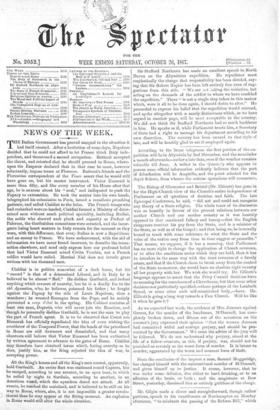The Bishop of Gloucester and Bristol (Dr. Ellicott) has gone
in for the High-Church view of the Church's entire independence of Parliament on all questions of doctrine and faith. The late Episcopal Conference, he said, "did not and could not recognize- any theory of a State religion. The whole tenor of its discussion. was as heartily in favour of the present relations between our mother Church and our mother country as it was heartily/ opposed to that continued fallacy and heresy—that the English, clergyman receives his pay from the State, and is a minister of the State, as well as of the Gospel ; and that being so, he is morally bound to teach with some reference to what the State and the voice of the nation may from time to time suggest or prescribe.' That means, we suppose, if it has a meaning, that Parliament has no more right to change the application of Church revenues, or to alter the conditions under which they are held, than it has to interfere in the same way with the trust revenues of a family estate, and that if the Church chose to break away from the control of the State to-morrow, she would have an absolute right tecarry all her property with her. We wish she would try. Dr. Ellicott's language appears to assert that the Privy Council decisions have no meaning for the conscience of a Churchman, but that some other decisions not particularly specified,—those perhaps of the Lambeth Synod, or some other such self-constituted body,—have. Dr: Ellicott is going a long way towards a Free Church. Will he like it when he gets it ?


































